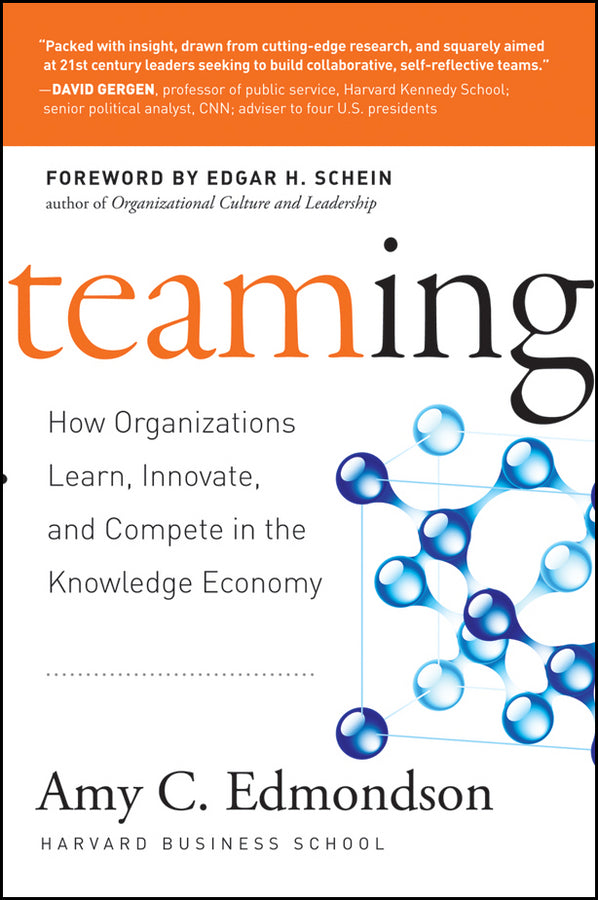Description
Discover the transformative power of effective collaboration with 'Teaming,' a groundbreaking book by Amy Edmondson, published by John Wiley & Sons Inc in 2012. This essential read spans 352 pages and unveils fresh insights into organizational learning, leadership, and the dynamics of change. In a rapidly evolving business landscape, understanding complex systems and fostering continuous improvement are paramount. 'Teaming' emphasizes the crucial role small groups play in an organization's success and illustrates the importance of learning through flexible, fluid collaborations. Leaders can cultivate high-performing teams by addressing barriers to learning such as interpersonal fear and groupthink. Edmondson offers practical strategies to promote psychological safety and encourage reflection, helping teams to thrive amidst challenges. This book is an invaluable resource for those looking to enhance their team dynamics, drive innovation, and unlock the full potential of their organizations. Plus, enjoy free shipping on your order, with a delivery timeframe of up to 6 weeks. Please note that once your order is placed, it cannot be canceled. Elevate your organizational capabilities today with 'Teaming.'
Note: Shipping for this item is free. Please allow up to 6 weeks for delivery. Once your order is placed, it cannot be cancelled.
Condition: BRAND NEW
ISBN: 9780787970932
Year: 2012
Publisher: John Wiley & Sons Inc (US)
Pages: 352
Description:
New breakthrough thinking in organizational learning,
leadership, and change
Continuous improvement, understanding complex systems, and
promoting innovation are all part of the landscape of learning
challenges today's companies face. Amy Edmondson shows that
organizations thrive, or fail to thrive, based on how well the
small groups within those organizations work. In most
organizations, the work that produces value for customers is
carried out by teams, and increasingly, by flexible team-like
entities. The pace of change and the fluidity of most work
structures means that it's not really about creating effective
teams anymore, but instead about leading effective teaming.
Teaming shows that organizations learn when the flexible,
fluid collaborations they encompass are able to learn. The problem
is teams, and other dynamic groups, don't learn naturally.
Edmondson outlines the factors that prevent them from doing so,
such as interpersonal fear, irrational beliefs about failure,
groupthink, problematic power dynamics, and information hoarding.
With Teaming, leaders can shape these factors by encouraging
reflection, creating psychological safety, and overcoming defensive
interpersonal dynamics that inhibit the sharing of ideas. Further,
they can use practical management strategies to help organizations
realize the benefits inherent in both success and failure.
Presents a clear explanation of practical management concepts
for increasing learning capability for business results
Introduces a framework that clarifies how learning processes
must be altered for different kinds of work
Note: Shipping for this item is free. Please allow up to 6 weeks for delivery. Once your order is placed, it cannot be cancelled.
Condition: BRAND NEW
ISBN: 9780787970932
Year: 2012
Publisher: John Wiley & Sons Inc (US)
Pages: 352
Description:
New breakthrough thinking in organizational learning,
leadership, and change
Continuous improvement, understanding complex systems, and
promoting innovation are all part of the landscape of learning
challenges today's companies face. Amy Edmondson shows that
organizations thrive, or fail to thrive, based on how well the
small groups within those organizations work. In most
organizations, the work that produces value for customers is
carried out by teams, and increasingly, by flexible team-like
entities. The pace of change and the fluidity of most work
structures means that it's not really about creating effective
teams anymore, but instead about leading effective teaming.
Teaming shows that organizations learn when the flexible,
fluid collaborations they encompass are able to learn. The problem
is teams, and other dynamic groups, don't learn naturally.
Edmondson outlines the factors that prevent them from doing so,
such as interpersonal fear, irrational beliefs about failure,
groupthink, problematic power dynamics, and information hoarding.
With Teaming, leaders can shape these factors by encouraging
reflection, creating psychological safety, and overcoming defensive
interpersonal dynamics that inhibit the sharing of ideas. Further,
they can use practical management strategies to help organizations
realize the benefits inherent in both success and failure.
Presents a clear explanation of practical management concepts
for increasing learning capability for business results
Introduces a framework that clarifies how learning processes
must be altered for different kinds of work

